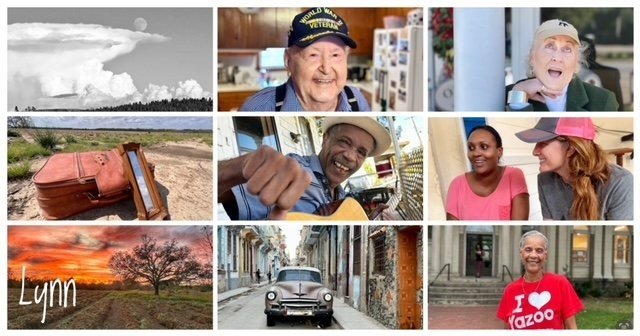Serious Daring
I turned 50 this week.
I was supposed to celebrate on the porch of Eudora Welty's house in Jackson, MS, reading her words and mapping out where she took pictures in the Mississippi Delta during the 1930s. The plan was to take pictures in those same locations and interview the oldest people in the smallest towns -- collecting life advice and preserving stories.
I wonder if every woman from Mississippi who dreams of being a writer feels the shadow of Eudora? No one can write about the South as well as she did, so why try? But we do it anyway, even if we will never write sentences like these from “The Worn Path.”
She wore a dark striped dress reaching down to her shoe tops, and an equally long apron of bleached sugar sacks, with a full pocket: all neat and tidy, but every time she took a step she might have fallen over her shoelaces, which dragged from her unlaced shoes. She looked straight ahead. Her eyes were blue with age. Her skin had a pattern all its own of numberless branching wrinkles and as though a whole little tree stood in the middle of her forehead, but a golden color ran underneath, and the two knobs of her cheeks were illumined by a yellow burning under the dark. Under the red rag her hair came down on her neck in the frailest of ringlets, still black, and with an odor like copper.
I have an imaginary connection to Eudora. She was born on my birthday, April 13, in 1909, 111 years ago. My grandfather was born in Jackson a year later. They were in the same class for 12 years, starting at Davis School with the strict perfectionist principal Miss Duling who lives on in the stories written or passed down by her students. My grandmother was a grade behind them. All three went north for education, but returned to Jackson.
Eudora lived in the house her father built on Pinehurst Street until her death in 2001. My grandparents lived only a few streets away. My uncle was her paperboy and later a friend. My aunt took her picture for Time magazine’s issue about "The New South" in 1976. They all shopped at Jitney 14 in Belhaven.
By the time I was old enough to understand who Eudora was, she looked a bit like my grandmother, with similar hair. They both wore knit suits with skirts and pantyhose. Their voices were different versions of the "Old Jackson'' accent, but they pronounced words like stories, New York, gorgeous, and Sister the same.
I never met Eudora, but she and my grandmother stand on the same pedestal. The biggest accomplishments for both women came in their 50s, 60s, and 70s. In her 50s Eudora was elected to the National Institute of Arts and Letters, and a play ran on Broadway based on her novella The Ponder Heart. She won the Pulitzer Prize at age 64 and was awarded the Presidential Medal of Freedom at age 71. My grandmother was raising teenagers in her 50s, then went back to school in her mid-60s for her Doctorate of Philosophy. Her dissertation became the model for the Willowood Foundation in Jackson that still provides services for adults with developmental disabilities such as vocational training, community housing, and apartments, as well as day services.
My birthday wish would be asking them both for advice about where life goes from 50. What were their fears and insecurities? What mistakes did they make? What would they do differently?
After my grandmother raised four children, she couldn’t settle down to a life of playing bridge with friends. She served on the board of the Sanders School for Cerebral Palsy and heard the same questions: What can I do with this child? One day I will be gone, and who will care for him?
At that time, people with disabilities were hidden away with few services. Grandmama wanted to help the parents, so she went back to college to get her Ph.D. For five years she left Jackson at 4:30 a.m. on Monday mornings, drove 2 1/2 hours to Southern Mississippi in Hattiesburg to attend classes during the week, then returned to home on Friday.
"I cared enough to begin the research and find solutions," she said in a video recorded with my grandfather 30 years ago. "After Willowood opened, I had the joy of talking with parents pleased to see that there would be a place for their adult children to go and someone would always look after them." She named the center Willowood because willow is a soft and pliable wood that can be molded into something useful.
I take this as advice from my Grandmother: Care enough about people to find solutions to their problems, even if it takes years of sacrifice and educating yourself to do it.
Eudora left books, photographs, lectures, and interviews behind. Before she started writing, she took pictures during the Depression for the Works Progress Administration. Being a photographer allowed her to go to places she had never been and see people she had never seen. Her photographs showed the dignity of poor, white Mississippians, and of black life during the time of deep poverty and segregation. She met all sides of Mississippi and wrote about this for five decades.
Eurora called herself a "passionate observer," wanting to validate experiences and show humanity with respect and admiration. She approached people with a curiosity of wanting to understand, and people let her in. She called it, "catching humans in the act of living" and "holding moments safe."
Her descriptions of writing and photography are my feelings of taking pictures and listening to stories. Feelings I miss right now.
"My wish, indeed my continuing passion, would not be to point a finger in judgment, but to part a curtain, that invisible shadow that falls between people. The veil of indifference to each other's presence, each other's wonder, each other's human plight."
"In the most unpretentious snapshot lies the wish to capture fleeting life. To rescue from oblivion fellow human beings caught in the act of living."
"We steal spirits and souls if we can, and in love and devotion, what we do but pray: keep this as it is. Hold this moment safe."
"The camera was a hand-held auxiliary of wanting to know."
"Life doesn't hold still. A good snapshot stops a moment from running away."
"Through travel, I first became aware of the outside world. It was through travel that I found my own introspective way into becoming a part of it. The outside world is a vital component of my inner life."
"Wherever you go, you meet part of your story."
"Long before I wrote stories, I listened for stories. Listening for them is more acute than listening to them."
The last line of the book, One Writer's Beginnings, taken from her lecture series at Harvard is: "As you have seen, I am a writer who came of a sheltered life. A sheltered life can be daring as well. For all serious daring starts from within."
Years ago, my mother gave me a silver bracelet for my birthday with, "All serious daring starts from within... Eudora Welty." I don't wear the bracelet out of fear of losing it, but it is always there. If I ever get a tattoo, this will be it.
My mother took me around the world and forced me into situations outside of my comfort zone. She sent me to camps and church events where I knew no one, and dropped me off saying, “Things are rarely as bad as the fear in your head. Have a good attitude and you will be fine.” She was determined that I would see the world outside of Yazoo City and have the courage to try.
Mama no longer remembers my birthdays or sends cards with sweet notes that say, “you mean so much to me” and “we are proud of you” like she used to. Dementia erased her memories and any advice she would give. But she still gives me big smiles and says, "I love you, come see me."
She was right forcing me into the uncomfortable because I became curious, open, and sometimes fearless. Maybe reminding me that I can survive the things that scare me is the advice she would give.
Times like this, I miss having the women I came from (and Eudora) to lean on and ask, “What now?” I may be grasping for the advice they would give, but I have their words and the examples of the lives they lived.
Be a passionate observer. Care enough to help.
And all serious daring starts from within.






